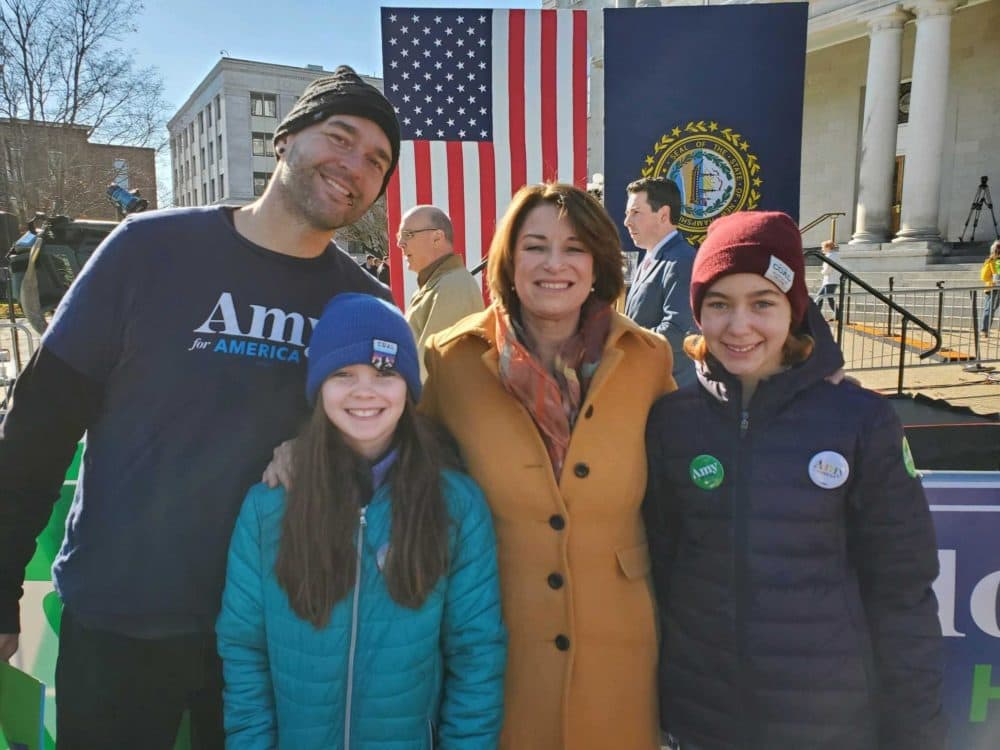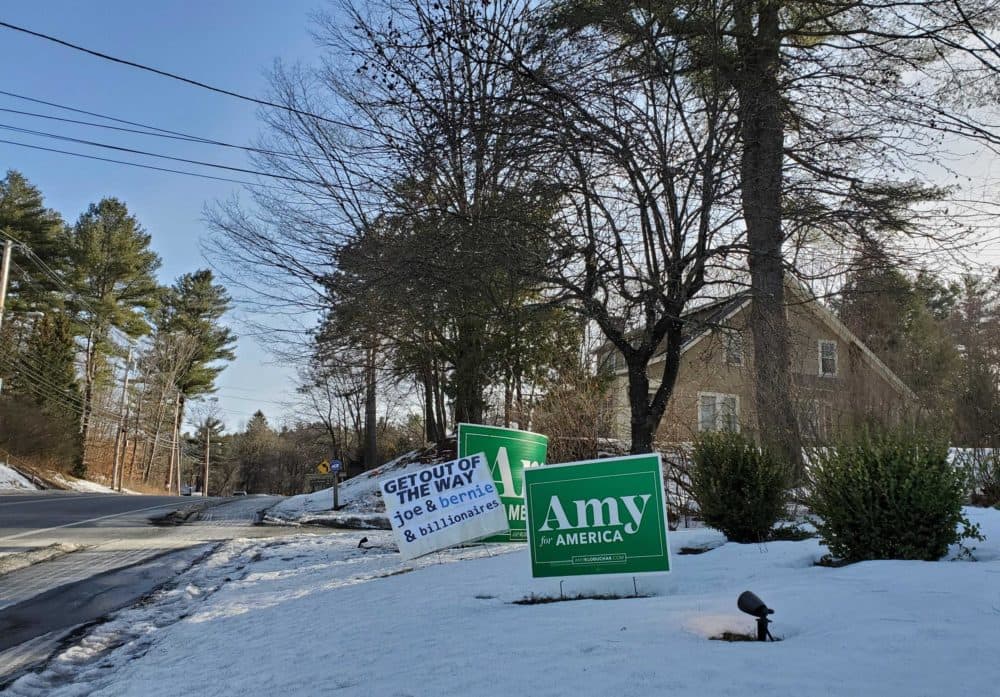Advertisement
Some N.H. Voters Are Reticent To Talk About Gender. Others Are Seizing The Chance
Resume
For the past few months, the Coylewright family's house on Hanover’s busiest road has stood out. It didn’t just have one candidate sign. For several months, it had three.
“Amy, Warren and Kamala Harris,” remembers Willa Coylewright, a fifth grader, referring to Amy Klobuchar, Elizabeth Warren, and Kamala Harris, who has since dropped out of the race.
Willa, along with her sixth-grade sister Angel, have watched the debates and even gone out canvassing with their dad.
And they’ve noticed something about the American presidency. It was even visible on a place mat in their house.
“I remember looking at it, and seeing there were no women, and being really surprised there hadn’t been women presidents,” says Angel.
The Coylewrights frequently talk about gender and sexism.
Their dad, Jeremy Coylewright, is getting his master’s degree online while he takes care of them and their brother.
Their mom is an interventional cardiologist, a field made up of just 4% women. They say they’re all proud of the work their mom does.
“I think it’s cool that she’s the leader and she’s the teacher, and she’s teaching everyone to do this stuff,” Angel said.
“So sometimes those are stories about mom coming home and getting a surprise response from patients, ‘oh, you’re the one who replaced my stent?’" Jeremy said. "And the kids saying, ‘why were they surprised by that?’"
Jeremy says they all agree that if a woman were to become president, that could encourage more women into positions of politics and leadership, and that would be good for the country — for both women and men.
“I think it’s a piece of justice to have parity in terms of representation in leadership. Again, that’s not something we’ve ever had - in terms of having parity with women in power,” Jeremy said.
The Coylewrights have decided who they’re supporting. So they only have Klobuchar’s signs in their yard now. They think she’s the most electable.
But at the end of the day, with talented women running for the presidency, Jeremy says it just makes sense to vote for one of the women.
And so amid the cluster of green signs is one Jeremy made by hand. It reads: “Get Out of the Way Joe & Bernie & Billionaires ”

“I really like seeing that sign about getting the men out of the way so the women can have a better chance of getting elected,” says Mary Jane Mulligan, a state representative from Hanover. She says she sees that sign every time she’s driving out of town.
Mulligan describes herself as a baby boomer, and she also thinks a country that’s majority female should be led by a woman.
But she finds some of her peers are reticent to talk about how gender factors in to deciding who to vote for.
“Some will say I’m sexist because I want to put a woman in the White House," she said. "Others will say, ‘Oh, I don’t vote for a woman. I don’t vote for anyone based on their gender. I base it on their ideas.’”
A poll out last week reports that nearly 71% of Democrats and Independents say they would be comfortable with a woman candidate themselves, but only 33% believe their neighbors would be.
“It’s that moment where I wish you could just close your eyes and I could read you resumes. Then I want you to blindly pick something, and then oh surprise it happens to be a woman,” said Brittney Joyce, a Hanover resident who’s been knocking on doors for Elizabeth Warren with her husband.
The two weren’t always Warren supporters. They started out as gung-ho for Joe Biden.
But after watching the first debate, learning more about the candidate’s platform and connecting with Warren’s personal story, the two decided they were all in for her.
As they’ve been knocking on doors, though, there are occasions when the couple hears a woman can’t win this election. They have a strategy to address that.
“Sometimes I will say, ‘What are the characteristics you’re looking for?’"
People respond with experience or a history of bipartisanship.
“You know you’re talking about a woman, who happens to be Elizabeth Warren or the other way around,” Brittney will then point out.
Her husband, Brian, acknowledges it can be hard to shift the conversation, but this is a start.
“I think the best way is to say, what kind of person would you want to elect, trying to peel back some of the layers of that bias,” he said.
In talking with friends and family, they’re also encountering what they see as sexism, like when a relative said they didn’t like Warren’s hair or a friend didn’t like her tone.
“I’m like, I do want to point out that we would never say that about a man, would you?” she said.
“We never talk about a man’s appearance, do we?” Brian chimes in.
Brittney says she’s getting tired of comments like this that put women under a microscope. She says it’s something she and other ambitious women have experienced for a long time — going all the way back to high school student council.
“You would run against the really popular boys who had no experience but they were loud and they played sports and they made friends. And you’re like, but I’ve planned everything,” she said, “I’ve done every car wash; I’ve painted every poster; I’ve been to every school board meeting."
"Why is this just a popularity contest?” she said.
In this way she says, the canvassing, the conversations, and finding those nuggets she and her husband can push back on — all that serves a higher purpose: getting people to see that a woman can lead the country and trying to change the way that we talk about gender.
This story is a production of the New England News Collaborative and was originally published by New Hampshire Public Radio.
This segment aired on February 7, 2020.